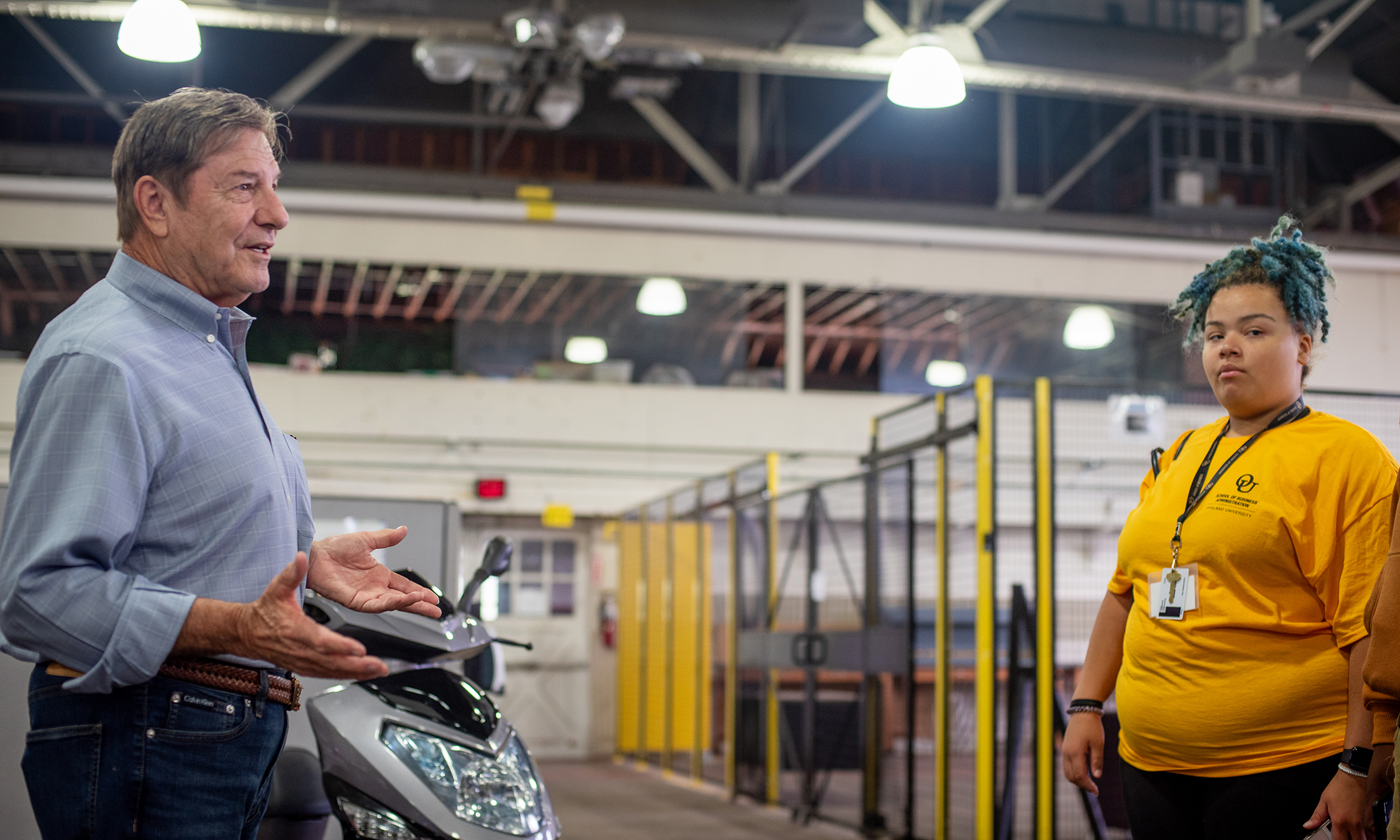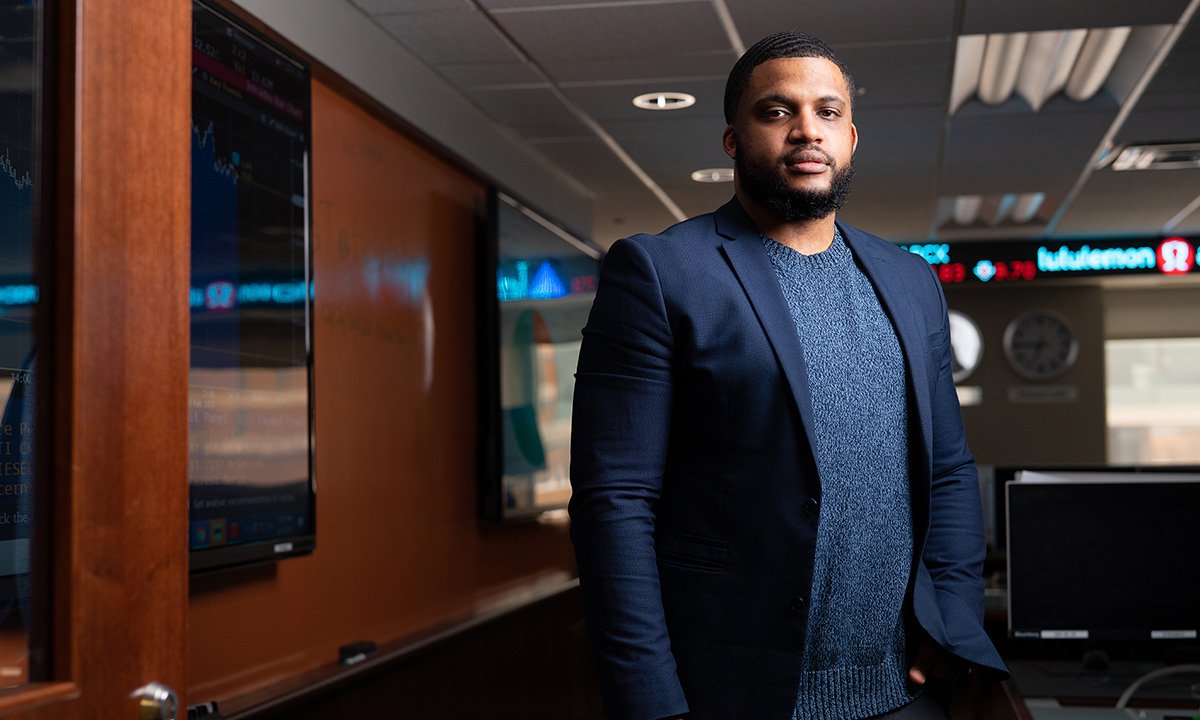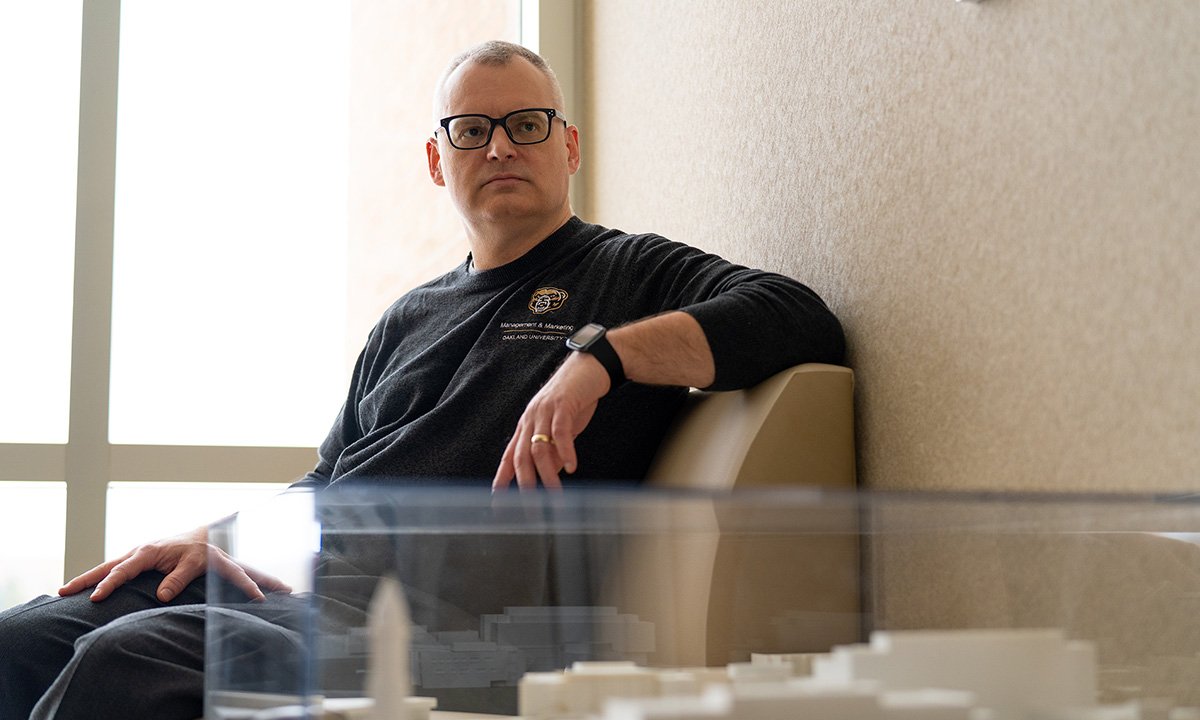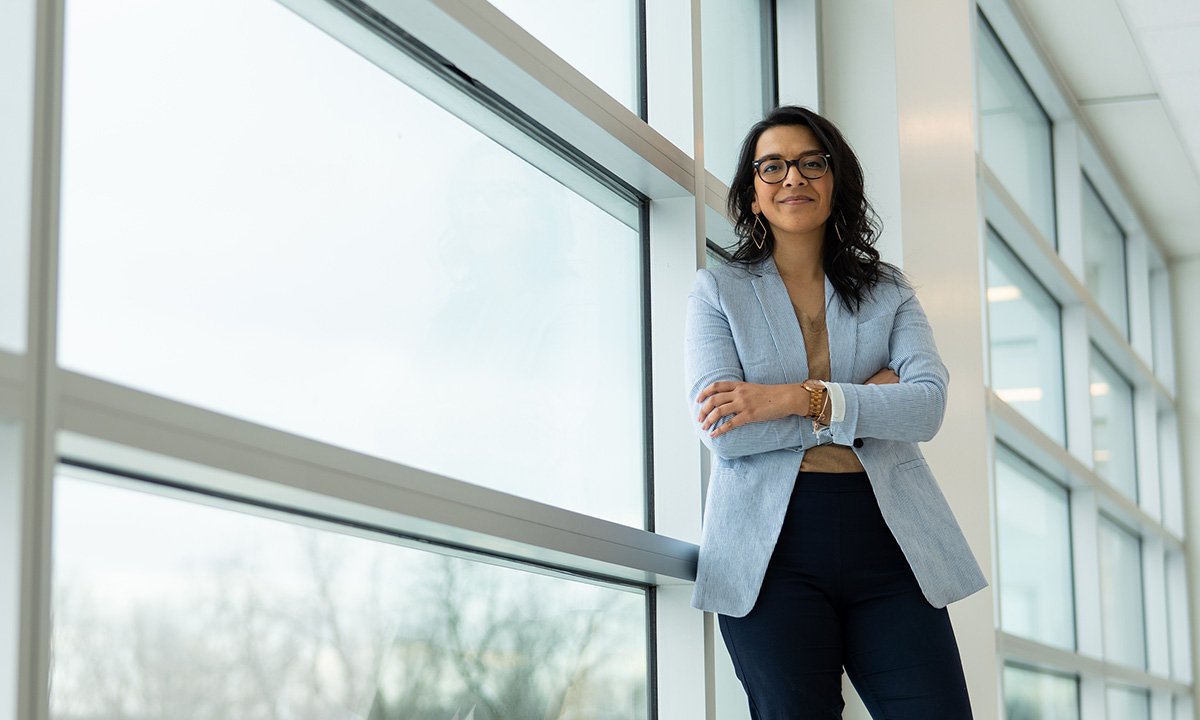A World of Possibilities
Pontiac students gain fresh insight at OU’s Entrepreneurship & International Business Camp
It was four days of building knowledge, exploring new ideas and participating in the unfamiliar; by week’s end, 22 Pontiac high school students bravely stood before their peers, families, and OU faculty – and they delivered.
“We were all blown away,” says Frank Cardimen, lead faculty advisor and chief organizer of the first Pontiac-focused OU Entrepreneurship and International Business Camp. “Seeing them get up there and do a great job was so rewarding. They even answered questions following their presentations. We were so proud of them.”
The students gave their PowerPoint presentations on the last day of camp, and it was a culmination of a week-long immersion in both the concepts and realities of the world being the marketplace.
“Entrepreneurship is tied to the international scene, so the presentations they gave were about the projects they worked on throughout the week, on a new product to introduce to a different country,” explains Cardimen, a professor with 44 years of teaching within OU’s School of Business Administration (SBA).
The week was jam-packed with events to explore entrepreneurship ideals, business leadership and the global business environment: lectures by faculty; networking opportunities with entrepreneurial organizations/business leaders; fun business-related field trips; exposures to university life and career possibilities; and interactive activities to expand skillsets. Students also learned the ins-and-outs of applying to OU.
The ball got rolling for Pontiac students to take part in this unique experience when Cardimen received a call from OU alumni Dr. Samino Scott, executive director of Pontiac Collective Impact Partnership (PCIP).
Making it happen
Housed under the “#IAmPontiac” umbrella, one of the PCIP’s overarching missions is to ensure educational “cradle to career readiness” for Pontiac youth. Oakland University is an anchor institution of the PCIP.
“Samino wanted to know if we’d like a full class of Pontiac students for this camp,” says Cardimen. “I’d been trying to get Pontiac students out to our camp for several years, so his call was a blessing.”
Scott says that the PCIP has a grassroots approach, in convening and utilizing area businesses, organizations and educational institutions to expand the access, opportunities and resources for the Pontiac community.
“Along with the Pontiac School District, OU has a great educational role to play in this,” Scott says. “My wife and I are so grateful for the degrees and experiences we received at OU…I want to do all I can to see that Pontiac youth receive those kinds of opportunities.”
Only 10 minutes away from all OU has to offer the Pontiac community, it was a youth entrepreneurship grant (through Michigan’s Statewide Equity Fund and support from the Pontiac Funders Collaborative) that paved the way for Pontiac students to come to campus. In addition to covering camp costs (including transportation), the grant also made it possible for students to stay overnight in OU dorms.
“It helps you, living with people you don’t know [in the dorms],” says camp student Armani Montgomery. “It helps you to step out of your comfort shell and start talking to others.”
For most camp participants, it was the first time visiting a college campus, Scott says. He found the parents to be “incredibly supportive and excited” about seeing their children perform in a university environment.
“I’m proud of my daughter, with the project – all she experienced – and with her opening to see new opportunities available with entrepreneurship,” says Lyniel Odneal, parent of a participating student. “Entrepreneurship is a field that she wasn’t really comfortable with, in the beginning, but she gained a lot of information as part of this program…I thought it was a great experience to be part of.”
Getting to the final day of successful PowerPoint presentations began with preparation and plenty of hard work.
It’s all about the journey
“I’m not sure the students knew exactly what they’d signed up for when they got here,” chuckles Cardimen. “I worked them hard all week, and they lived up to the challenge.”
Throughout the years, as a complement to teaching international business classes, Cardimen has taken OU undergraduates and graduates abroad to places including the UK, China, France, Belgium, and the Czech Republic; it was a chance for those students to have an up-close look at other cultures and the global interconnection of business. In a similar vein, Cardimen wanted to share that bigger world with the Pontiac students.
First, he needed to provide context.
“We began our first day discussing how old our country is – about 250 years –
and young, relative to other countries,” Cardimen says. “The overarching question I posed to them was: ‘So how did this country become the greatest economic power?’”
So that students got the bigger picture, Cardimen asked them to do some follow-up written work on the size of the U.S. economy versus other countries. He also got them up-to-speed on some crucial world economic concepts, such as GNP and imports and exports. Cardimen also imparted additional information related to international business and entrepreneurship. Other SBA faculty spoke to the students about marketing, leadership, and logistics.
Students were then divided into small groups, where they began thinking about what their new product might be – how they’d market it – and what the right country was for their product. Along the way, they acquired new geographical knowledge.
“I cautioned them that if they were going to have a chance to successfully market a product in another country, they’d need a good understanding of an array of factors about another country: its history, culture, language, economy and politics,” Cardimen says.
They listened well.
One group came up with a new product for tennis shoes for the blind, in which cameras installed in the shoes would detect objects overheard or to the sides – in essence, “radar shoes” that assist the blind to know, for instance, when to stop walking at a stop sign.
“That group’s research efforts showed that London has the highest population of blind people, so that was their marketplace,” Cardimen says.
The team approach to research yielded other significant positives.
“You could see their cooperation and support toward each other begin in those groups,” Scott says. “I also saw those light bulb moments happen, and those were heartfelt moments.”
The other component for a successful final presentation involved learning a new skillset: how to use virtual presentation software. Throughout the week, Cardimen worked with students on the PowerPoint piece.
Emphasizing that the week was about much more than accomplishing one project, Cardimen says he witnessed an epiphany among the students, most of whom would be the first in their families to attend college.
“They saw what education can do for them and all the interesting things they can learn,” he reflects. “They saw the possibilities it opens up for them.”
For one student, the camp’s global project assignment was right in line with her dream of developing a product to benefit others.
“I’ve been interested in entrepreneurship since around age six,” says camp student NyKolas Harris. “I’ve always wanted to help as many people as possible, wherever they are around the world, whatever their situation…I want to be part of making changes in the world that need to be made – possibilities for everybody.”
Scott noticed that students especially appreciated hearing from faculty.
“If you think about it, an incoming college student usually sees everybody else first – the admissions and dorm folks, and then other students – before ever setting foot in a classroom to hear from a professor,” says Scott. “Here, students got to have that faculty experience right away.”
One faculty speaker was OU Senior Vice President of Student Affairs and Chief Diversity Officer Glenn McIntosh, who inspired students with his dynamic ways and sage advice.
“The idea is to be a sponge and take advantage of this,” McIntosh told the students. “Everyone you meet [through the camp], you should be coming up to them and asking, ‘Can I get your number? Can I get your email?’ Because that person now becomes a part of your network, and your network relates to your net worth.”
Students were given plenty of opportunities to take his advice to heart.
Engaged in extras
There may not have been campfire S’mores at OU’s business camp, but there were mouthwatering donuts.
As one of three field trips, students were treated to an on-campus tour of Krispie Kreme, where they learned about supply chain management and how to produce a quality product.
“The manager at Krispie Kreme was fantastic,” Cardimen says. “She showed us what an exact science it was to make the donuts, right down to the type of oil and temperature. We all learned a lot, and as the students later ate their donuts, they had a greater appreciation for what went into it.”
Touring Meadow Brook Hall was another fun outing. Students got to see the unique architecture and design of the on-campus estate that was built by Matilda Dodge Wilson, co-founder of OU. They learned that most of the funding for Meadow Brook Hall came from the Dodge brothers (John and Horace), who were highly successful auto industry entrepreneurs in the early 1900’s.
The third field trip that the students greatly enjoyed was a visit to the OU Incubator, a centralized office/meeting place that helps “grow a new business,” by assisting new entrepreneurs in taking their ideas all the way to the marketplace. In addition to learning how factors such as government controls, financing, and taxes affect profit, students also learned about the “four P’s” of marketing (product, price, place, and promotion). They listened to and talked with entrepreneurs in three companies, all at different stages of product development: an AI company; an engineering process company; and a company developing a vehicle a little larger than a golf cart.
“Students got to drive those vehicles, and they had a great time,” Cardimen says. “Our hope is that all they learned stays with them.”
It sounds like it will.
“We got to do a lot of exploring,” says camp student Jamad Williams. “We went to the OU Incubator and got to see a lot of businesses and how they’re doing. They’re really attacking it – really going after it. ‘You’re going to fail in this field the first time [you try]’ – that’s what a lot of them said to us – but you just gotta keep moving forward.”
The full 9 a.m. to 5 p.m. camp day was followed by plenty of after-hours activities before “lights out.” Students were kept busy with a movie night; a visit from students from Project Upward Bound, a multi-faceted college preparatory enrichment program; and talks with young entrepreneurs from both the Yaktown Don’t Back Down clothing company and Effigy Media Arts Company.
“I saw that the entire camp experience inspired them to go to college, and I’m so appreciative to everyone who poured so much into the students all week,” says Scott. “It was a joint effort between OU faculty; administrative/admissions staff; OU special programs staff; residence hall staff; and Oakland Center folks…so many people worked to make this happen.”
One student had a simple but profound thought on attending camp.
“I recommend the camp to anybody who wants to have a good footing on becoming an entrepreneur,” camp student Elisha Henderson says. “But really, it was a good experience just being around people your own age and getting out of the house.”
It’s often about showing up to seize life’s opportunities.

 November 30, 2023
November 30, 2023
 By Mary Gunderson-Switzer
By Mary Gunderson-Switzer



